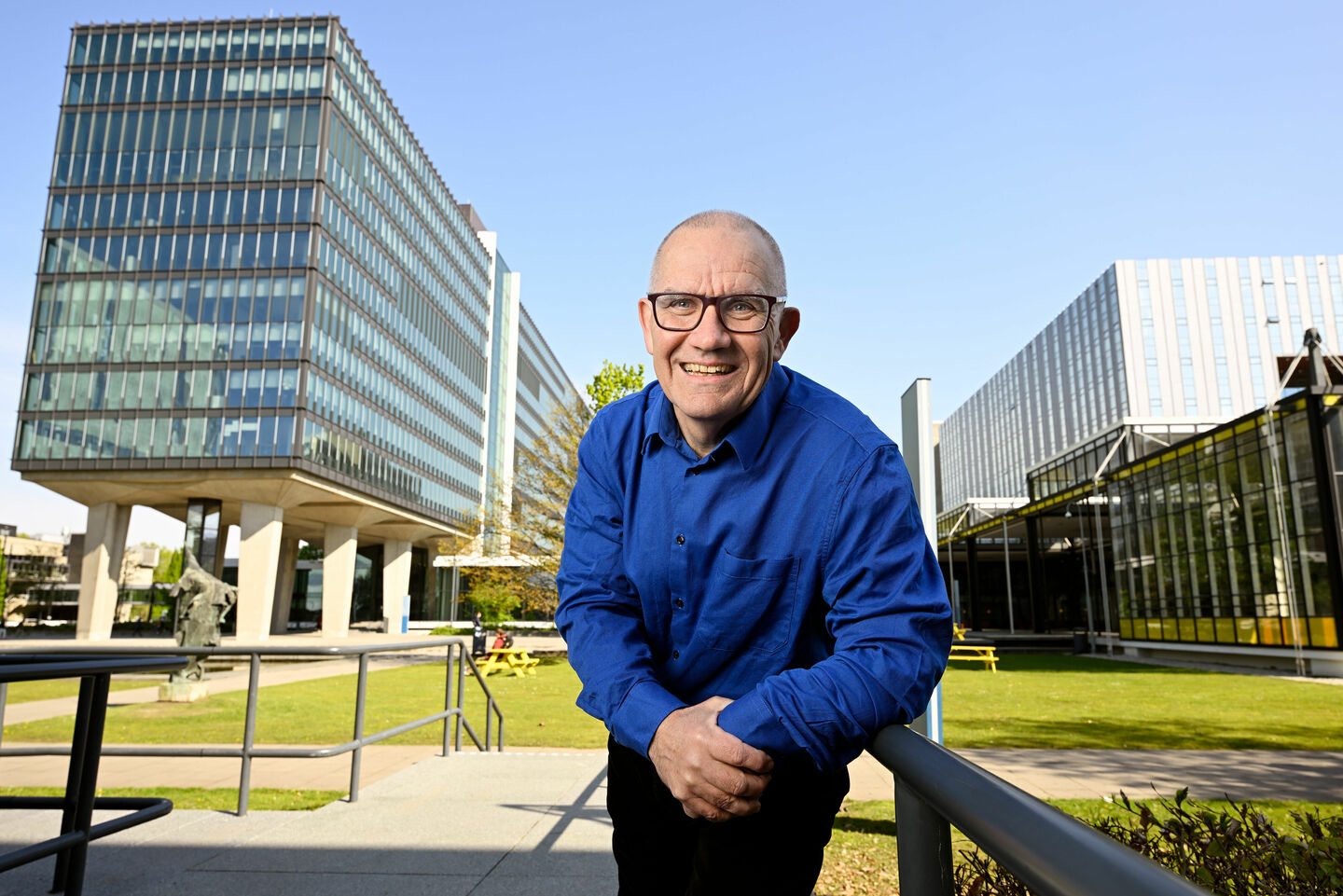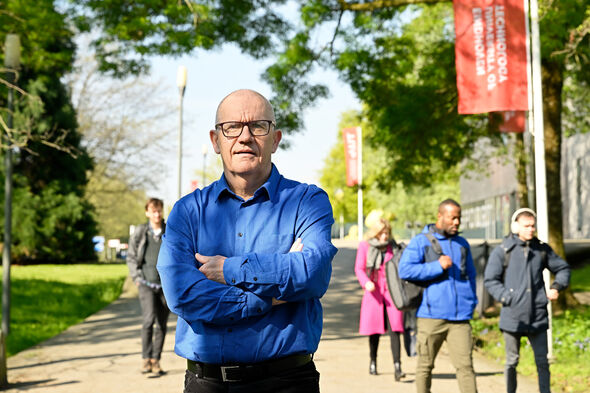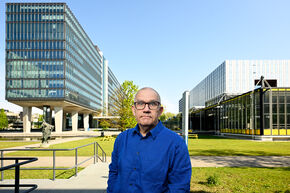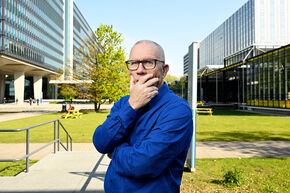
After 30 years mister Cursor Han Konings leaves
“I’ve become intertwined with TU/e”
Cursor’s editor-in-chief Han Konings only had to walk across campus for an hour and he would come back with a treasure trove of story ideas. After 30 years at TU/e, he is now leaving. Konings used to see students reading printed editions of Cursor in the lecture halls and discovered the importance of the digital Cursor during the Covid-19 era. “A good and independent medium is of great value to a university community.”
When Han Konings started as managing editor at university newspaper Cursor in 1994, TU/e was not the dynamic environment it is today. “Very little was happening here. It was a dull and sleepy place,” Konings recalls during a conversation at De Zwarte Doos. When he spoke to a professor in his office at the time, he noticed that the wall was full of cracks.
Initially, as someone with a background in humanities working in a science-oriented environment, Konings was a bit of an odd man out. In 1989, he graduated with a degree in General Literature Studies in Nijmegen. Before starting work in Eindhoven, he spent four years working at a trade magazine publisher in Nijmegen. “It was difficult to find work at that time. The publisher thought it’d be interesting to have someone with a university title on board, that would look good in the colophon,” Konings laughs. “I created magazines for the video industry and the outdoor advertising industry. A most unusual business.”
Hard work
In his first job, Konings says he learned how to improvise, shift gears quickly and build a network. Skills that would later come in handy at Cursor, because the small editorial team has to do everything themselves to publish a weekly printed newspaper. “It was a lot of hard work as managing editor, writing and editing articles. And because we didn’t have email yet, I would take a hard disk to our in-house printing office in the Main Building to deliver the newspaper’s digital files,” Konings recalls. The stands with Cursor newspapers that were all over campus at the time were also arranged by the editors themselves.
Then editor-in-chief Fred Gaasendam was quite early in digitizing Cursor. “We already had a website back in 1995. It didn’t really look like much, but Cursor did have an online presence.” Cursor continued to evolve on paper as well. Konings implemented a restyling, changing the newspaper format from A4 to tabloid. An improvement, according to Konings, “but not all students were happy with the larger format, because it meant they could no longer hide it in a textbook to read Cursor in the lecture hall unnoticed.”
We already had a website back in 1995. It didn’t really look like much, but Cursor did have an online presence
Since Gaasendam was busy with the digital development of Cursor, Konings, as managing editor, carried the responsibility for the paper edition. When Gaasendam was appointed Head of Communications at TU/e in 2011, it made perfect sense for Konings to assume the role of Cursor’s new editor-in-chief.
Anyone who revisits the old paper edition of Cursor will recognize the craftsmanship of a professional. The newspaper offered a wide variety of news, interviews, columns and cartoons. And if you look even further back, you will also find the menu of the Mensa [dining hall]. Scientists, staff, and students simply could not do without.
The newspaper never stood still. On the side, Konings also put together a magazine for alumni. First called Matrix, then Slash. Konings briefly sums up the common thread of many changes that happened: “Less budget, more work.” As a result of the ongoing digitization, the last ever paper edition of Cursor was published in 2018. Since then, the university newspaper has been "web only,” though available in both Dutch and English, as internationalization continued to progress as well.
The article Konings looks back on with the most satisfaction is an interview with Hans van Duijn, who served as Rector Magnificus from 2005 to 2015. “Van Duijn was a macher. He saw how motivation and study behavior were deteriorating at TU/e. As Rector, he wanted to get students back in line, light a fire under them. Education had to be taken more seriously, he believed. That’s what the interview was about, and it had quite an impact.”
A place for generalists
Van Duijn’s critical analysis hits like a bomb. During a discussion day organized by Studium Generale, the problem is talked about in depth. It ultimately leads to the foundation of the Bachelor College. “Not every student wanted to delve so deep into the content, Van Duijn thought. TU/e also needed to be a place for generalists or students who were drawn to entrepreneurship.”
This change also led to criticism and discussions. “That’s just how it goes in an academic environment. Some were afraid that the university would become too superficial. But it resulted in an increase in student intake. And looking at the numbers at the time, that was very much needed.”
Konings is also proud of ‘the quick adjustment’ during the Covid-19 period. “We quickly realized that the lockdown would pose a huge problem, especially for teaching, which suddenly had to take place online. A lot of hard work went into that,” Konings says. “Every Friday, I was in a Teams call with the Executive Board. What are you working on? What is being organized? How will it be implemented? We wrote it all down. That same afternoon, we would publish the news in two languages to inform everyone. The circumstances were dreadful, of course, but the importance of Cursor became clear; we were the go-to news source for the TU/e community. Website traffic skyrocketed, which was very satisfying to see.”
Whenever I walk along the balcony area in the Auditorium and look down, I see many students on their phones, but I never see anyone reading Cursor
There are also concerns, because those online visitors from the Covid-19 days do not come back to the site every day. “Whenever I walk along the balcony area in the Auditorium and look down, I see many students on their phones, but I never see anyone reading Cursor. They’re gaming, listening to Spotify or scrolling on social media.”
Students are showing less and less natural interest in the goings-on at the university, and that is affecting the traffic numbers on the Cursor website. “There used to be stands with paper editions of Cursor everywhere on campus. Students would grab one on their way out. Cursor has lost that. Cursor needs to draw in students, and that requires constant attention.”
Konings, as opposed to students, actually feels that he has become more and more involved with TU/e over the years. “As a Cursor editor, you’re at the center of the university.” But Konings says he never became fully part of the establishment. “As a journalist, you have to maintain your independence. You’re an observer, as editor, you don’t have an opinion of your own,” he says. “It’s also not up to journalists to propose solutions. You only identify problems and report on them. Of course, you do ask the person you’re interviewing how they think things could be improved.”
The journalistic independence of university media in the Netherlands is vital, Konings believes: “A good and independent medium is of great value to a university community. If there are injustices, they need to be exposed.” He points to the events at TU Delft: “University medium Delta has played a crucial role in bringing the discussion within the Delft institution to light.”
Konings dismisses the complaint that Cursor writes too negatively about TU/e: “People sometimes perceive critical articles as negative. But in an academic environment, you should be able to talk about things people disagree on. Moreover, it’s the university’s responsibility to help students develop a critical mind. Cursor is a medium where that critical debate is allowed to take place.”
Konings felt right at home on the Eindhoven campus. “When I had walked around campus for an hour, I always had at least five ideas for new stories. That made my work a lot of fun. I’ve really become a TU/e man over the past 30 years. My wife noticed that I always used “us” and “we” when talking about TU/e. I’ve always had good and pleasant interactions with everyone here, from students and staff to professors and administrators.”
Unfortunate
His much-discussed departure led to coverage in national newspapers and even parliamentary questions. Konings himself does not have much to say about it. “As editor-in-chief, you need to be able to communicate well with the Executive Board. I’ve always tried to keep the dialogue going, but unfortunately, it faded away.”
The man who, over the past 30 years, has earned the title of Mister Cursor, and who will officially leave his position on May 1, would have liked to stay a little longer, but he appears resigned. “To be honest, the past period has been quite tough, but it is what it is,” he says. His departure has not affected the sense of connection he feels with the university. “When it comes to scientific research, we are doing really well.”
Konings still talks about “we”. “And I’ll probably keep doing that. I’ve become intertwined with TU/e.”




Discussion